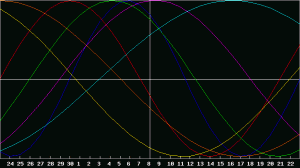
The concept of biorhythms was developed in the nineteenth century by Wilhem Fliess, a German physician, numerologist and friend of Dr. Sigmund Freud. He believed that everyone is ruled by either a 23-day (male) cycle or a 28-day (female) cycle. Several other individuals expanded on Fliess? theory in subsequent years; however, it gained a rise in popularity during the 1970s after the publication of ?Is This Your Day? How Biorhythm Helps you Determine Your Life Cycles,? by George S. Thommen and ?Biorhythm 1979-81 ? A Personal Science,? by Bernard Gittleson.
Biorhythms are invisible waves of energy within the human body that are constantly in flux. These energy levels are unique to each individual and begin charting at birth. It is believed that people have three main biorhythmic cycles: physical, emotional and intellectual. Other cycles have been added in recent years: intuition, spiritual and aesthetic. Some individuals also believe there are even more cycles that are combinations of the three main cycles: passion (physical and emotional), wisdom (emotional and intellectual) and mastery (intellectual and physical).
Biorhythm charts have been created to graphically track your high and low energy levels during the cycles. They are generated using an individual?s date of birth. Each cycle has a ?clock? and critical points within its timeframe. The clock is the length of time in a given cycle. Critical points occur when a biorhythm is at the zero line on the chart or when an upswing shifts to a downswing and vice-versa. Knowing your biological cycles can help you plan your activities for a specific period of time. For example, knowing your intellectual cycle can help you schedule activities requiring mental prowess for times when you are going to be at a high point in the cycle.
The physical cycle provides insights into your coordination, strength, well-being and energy levels. This cycle has a 23-day clock. High points in your cycle are excellent times to take on physically challenging ventures. Low points in your cycle indicate that you may be physically spent and need to take it easy for a while.
The emotional cycle provides insights into your creativity, sensitivity, mood, perception and awareness. This cycle has a 28-day clock. High points in your cycle indicate you are emotionally strong, your outlook on life tends to be at its best and your interactions with others are most successful. Low points in your cycle indicate times when you may need to take a step back, and you are more likely to be depressed.
The intellectual cycle provides insights into your alertness, analytical functioning, logical analysis, memory and communication. This cycle has a 33-day clock. High points in your cycle indicate that your mental faculties are sharp. This is the time for you to seek solutions that require logic and analysis. Conversely, your intellectual capabilities are not sharp at the low point in your cycle. You might find it prudent to delay work that requires serious thought until you reach a higher point.
The intuitive cycle provides insights into your intuitive strength. This cycle has a 38-day clock. During high points in this cycle, your powers of intuition are at their strongest and you might even experience moments of serendipity. These high points are times when you should be more willing to trust your hunches. During low points in this cycle, you might want to shy away from making decisions because “you just know” and rely on a more analytical approach to decision making.
The spiritual cycle provides insights into your spiritual self. This cycle has a 53-day clock. During high points in this cycle, you may reach new spiritual heights or have intense mystical experiences. During low points, you may not be particularly in sync with the spiritual side of life.
The aesthetic cycle provides insights into your creative powers. This cycle has a 43-day clock. During high points in this cycle, you are most open to the arts, as well as being at the pinnacle of your own creative powers. These are perfect times to express your creative self. During the low points in this cycle, you might put your energies into things that do not require large amounts of creativity.

FOR MORE INFORMATION ABOUT OTHER TYPES OF READINGS,
PLEASE VISIT THE READING ROOM.


